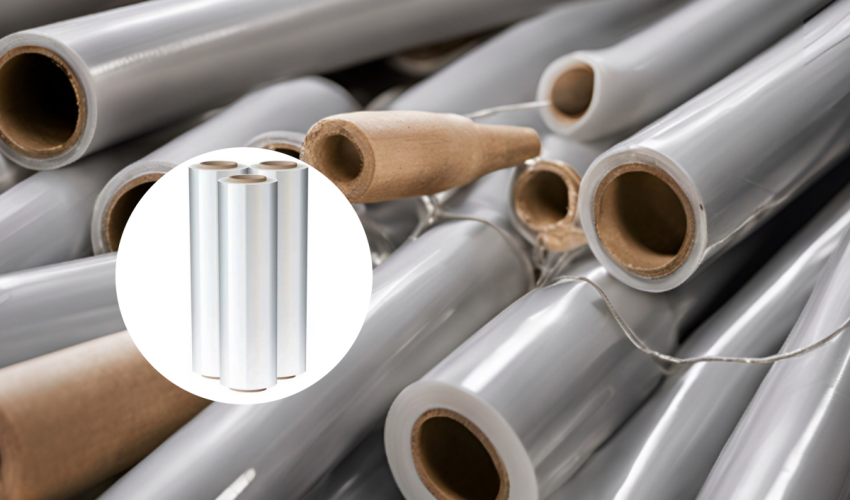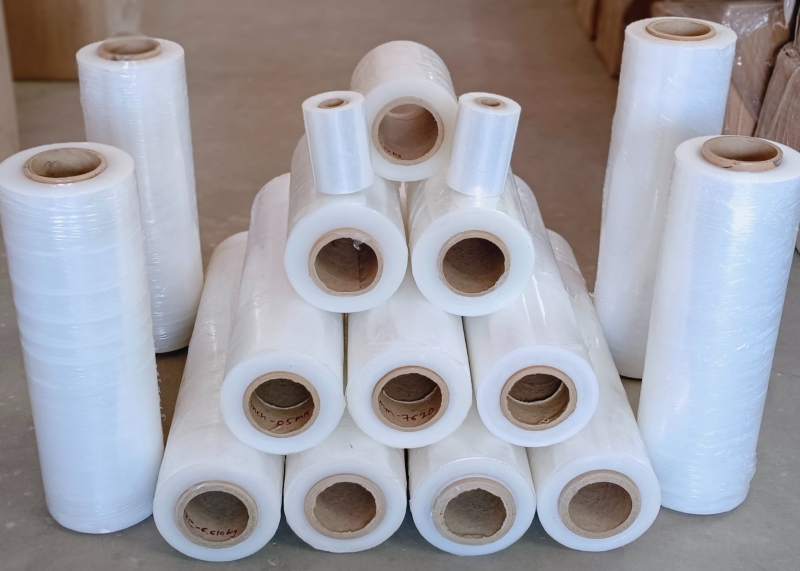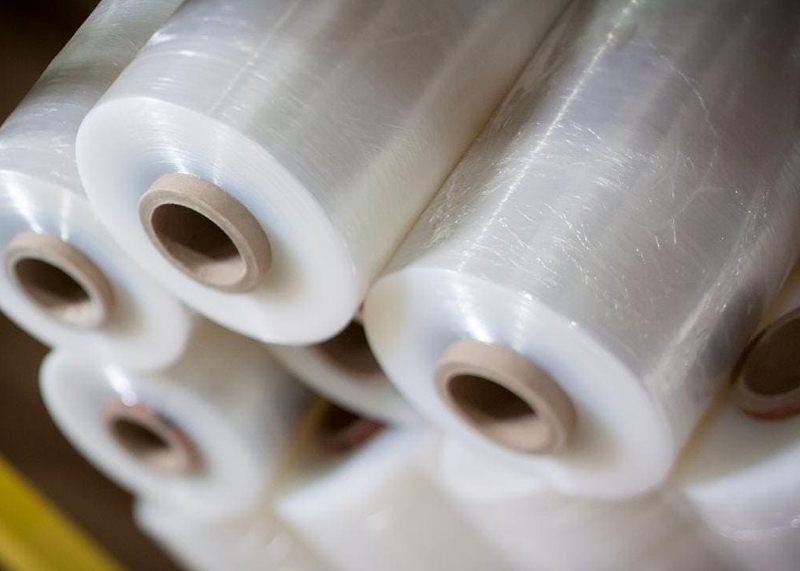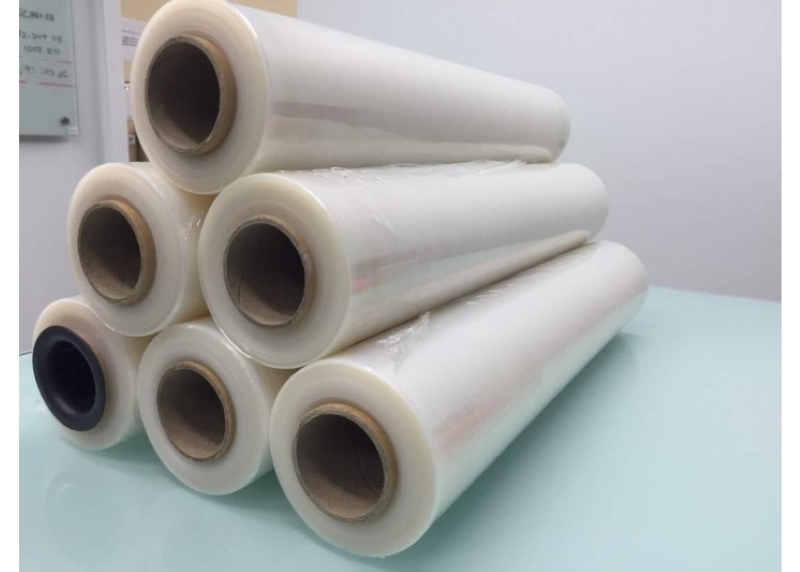
Wrapping film rolls are essential materials used in packaging to protect products during transportation, storage, and handling. These rolls are typically made from flexible plastic films that wrap around items to secure and shield them from external elements. Wrapping film rolls are commonly used in various industries, from food packaging to electronics, offering durability and ease of use. There are several types of film wrap rolls, each designed for specific applications. Wrapping nylon rolls are known for their strength and versatility, making them ideal for heavy-duty packaging. On the other hand, TPU (Thermoplastic Polyurethane) film rolls are highly durable and resistant to wear, ideal for products requiring a high level of protection. Both nylon and TPU wrapping film rolls are popular choices due to their reliability and efficiency in securing items for shipping and storage. Wrapping film rolls are versatile packaging materials, from machine stretch films to heavy-duty and pre-stretched options for securing products.
A wrapping film roll is a type of flexible, durable film commonly used for securing and protecting various products during transportation and storage. Made from high-quality nylon material, these rolls are designed to offer high tensile strength of stretch film and resistance to tearing, making them ideal for heavy-duty applications. Wrapping nylon rolls are typically used in industries that require robust packaging, such as logistics, manufacturing, and agriculture. The material is lightweight, yet strong enough to withstand physical stress, ensuring that products remain securely wrapped and protected throughout their journey.

The primary benefit of using a wrapping nylon roll is its excellent durability. These rolls offer superior strength and resistance to punctures and tears, providing reliable protection for items that may be subject to rough handling. Additionally, wrapping nylon rolls are highly stretchable, allowing them to conform to the shape of the items being wrapped, creating a tight, secure seal. This stretchability reduces the chances of shifting or damage during transit. Furthermore, wrapping nylon rolls are versatile and can be used to package a wide range of products, from fragile items to heavy machinery, making them an essential choice for businesses that require dependable packaging solutions.
Wrapping nylon rolls are used in a wide variety of industries due to their versatility. In the logistics and transportation sector, they are often employed to secure pallets and cargo, preventing movement and potential damage during shipping. In the food industry, wrapping nylon rolls are commonly used to wrap perishable items, ensuring they are protected from contaminants and extending their shelf life. These rolls are also utilized in the manufacturing of consumer goods, electronics, and automotive components, where their durability and protective qualities are crucial. Overall, wrapping nylon rolls are a critical packaging tool for businesses seeking reliable, cost-effective solutions for product safety and integrity.
A TPU film roll refers to a wrapping film roll made from Thermoplastic Polyurethane (TPU), a highly versatile and durable polymer known for its excellent physical properties. TPU film rolls are often used in packaging and protective applications due to their flexibility, tear resistance, and ability to withstand extreme temperatures and abrasion. These rolls are widely used for various purposes, from industrial packaging to consumer goods, thanks to the unique combination of strength, elasticity, and clarity that TPU offers. TPU film rolls are transparent, which allows for easy visibility of the packaged product while maintaining robust protection. Additionally, bundling stretch film is frequently incorporated to enhance the film’s ability to secure products during storage and transportation, offering extra stability while preserving the integrity of the packaging.
The use of TPU film rolls in packaging provides numerous advantages, particularly when it comes to durability and flexibility. One of the key benefits is their exceptional resistance to wear and tear, which ensures that products remain safely protected even during rough handling or harsh environmental conditions. TPU film rolls also offer high elasticity, allowing them to stretch and conform to the shape of the product, providing a secure, tight seal. Moreover, TPU film is resistant to chemicals, oils, and UV light, making it suitable for long-term storage and outdoor exposure, such as wrapping pallets for outdoor storage. This makes TPU film rolls ideal for applications that demand both strength and clarity, ensuring that products are securely packaged without compromising visibility.
TPU film rolls are essential in a variety of industries that require high-performance packaging solutions. The automotive industry, for example, uses TPU film rolls to protect parts and components during shipping, preventing scratches and damage. The medical and healthcare sectors also rely on TPU film for packaging medical devices, equipment, and sterile products, as its durability ensures reliable protection. In addition, the electronics industry uses TPU film rolls for protecting sensitive components from dust, moisture, and physical damage. Due to their versatility and durability, TPU film rolls are also increasingly used in food packaging, offering a secure and eco-friendly solution for preserving perishable goods. With their ability to withstand demanding conditions, TPU film rolls are a top choice for businesses that require durable and adaptable packaging solutions.
When searching for wrapping film roll manufacturers near me, there are several key factors to consider to ensure you find a reliable and reputable supplier. First, it’s essential to assess the quality of the film roll wrappings they produce. A good manufacturer will offer durable, high-performance materials such as nylon or TPU films that meet industry standards and customer specifications. Additionally, you should review the stretch film specifications to ensure they align with your requirements. Secondly, consider the variety of products the manufacturer provides. Whether you need specific sizes, colors, or film types, a supplier that can cater to different needs gives you greater flexibility. Additionally, check if the manufacturer has a history of timely delivery and strong customer service. Efficient logistics and support will ensure that your wrapping film rolls are delivered on time and with the appropriate support.
Finding top wrapping roll manufacturers near me can be done by conducting thorough research or asking for recommendations within your industry. Some leading companies specialize in the production of high-quality wrapping film rolls, offering various types such as TPU, nylon, or stretch films that are suitable for multiple stretch film applications. It’s important to check online reviews, request samples, and even visit facilities when possible to gauge the manufacturer’s capabilities. Many reputable suppliers are known for providing excellent custom solutions and a wide range of wrapping roll products that cater to both small businesses and large industrial clients. Being proactive in researching local options ensures that you find the best quality and most reliable manufacturers near your location.
Choosing the best wrapping roll manufacturer for your needs involves evaluating several criteria. First, ensure that the manufacturer specializes in producing the specific type of wrapping film roll you require,such as wrapping plastic roll. Some manufacturers may focus on biodegradable or eco-friendly film options, while others may provide more durable, high-strength films for heavy-duty packaging. Next, assess the manufacturer’s ability to meet production timelines, as delays in supply can affect your operations. You should also consider the level of customer service provided by the manufacturer. A supplier who offers responsive support, clear communication, and assistance with technical specifications is crucial. Finally, don’t overlook pricing – while it’s important to find a supplier that offers competitive pricing, make sure that the cost reflects the quality and value of the wrapping film roll. Balancing all of these factors will help you select the best wrapping roll manufacturer that aligns with your business’s needs and goals.
When selecting the right wrapping film roll for your business, it is essential to consider several factors to ensure the packaging solution meets your specific needs.

Here are some key points to consider:
By considering these factors, you can make an informed decision when selecting the right wrapping film roll for your business, optimizing both efficiency and cost.
Wrapping film rolls are versatile materials used across industries for protecting and securing goods during transportation, storage, and handling. Below is a detailed exploration of the various types of wrapping film rolls, highlighting their features, applications, and benefits.
Machine stretch films are specifically designed for use with automated stretch wrapping machines, making them ideal for high-volume operations.
Hand stretch films are designed for manual application, offering flexibility for small-scale or on-the-go wrapping needs.
Pre-stretched films are elongated during manufacturing, requiring less effort during application and reducing material usage.
Colored films serve dual purposes: securing loads and providing visual identification or branding.
Clear stretch films are among the most versatile options, offering visibility and strength for diverse applications.
Blown stretch films are made through a blown extrusion process, providing superior strength and resistance to harsh conditions.
Cast stretch films are produced using a cast extrusion process, known for their smooth and uniform texture.
OEM stretch film rolls are tailored to meet the specific needs of original equipment manufacturers, offering customizable solutions for packaging and securing products during transit and storage.
Key Features:
Applications:
Benefits:
By understanding the distinct features and benefits of each type of wrapping film roll, businesses can select the most appropriate option for their packaging needs, ensuring product safety and operational efficiency.
Wrapping film rolls come in a variety of sizes and specifications to meet diverse packaging requirements. Below is a detailed introduction to the most common sizes and specifications, ensuring you select the right type for your needs.

The width of a wrapping film roll determines the coverage area during application.
The thickness, often measured in gauge or microns, indicates the strength and durability of the film.
The roll length determines how much material is available for wrapping.
The core size impacts compatibility with manual dispensers and wrapping machines.
The material composition and production process determine the film’s performance.
Stretchability defines how much the film can elongate without breaking.
Some wrapping film rolls are designed with additional features for specific needs.
Selecting the appropriate size and specification of wrapping film roll ensures optimal protection, efficiency, and cost-effectiveness for your packaging needs.
Packaging and handling tools complement wrapping film rolls in securing, protecting, and transporting goods. While wrapping film rolls focus on wrapping and stabilizing loads, other tools provide additional support, durability, and convenience. Here’s a detailed look at different types of packaging and handling tools and how they differ from wrapping film rolls.
Packaging tapes are adhesive tools used to seal boxes, containers, and packages.
Strapping involves binding heavy packages or pallets with strong materials like plastic, steel, or polyester straps.
Shrink wrap is a plastic film that shrinks tightly around items when heat is applied.
Pallet covers are large sheets of plastic or fabric that drape over pallets for protection.
Foam sheets and bubble wrap offer cushioning and shock absorption for fragile items.
Cardboard boxes and edge protectors provide structural support and protection.
Handling tools like pallet jacks and hand trucks assist in moving heavy loads.
Void fillers occupy empty spaces within packaging to prevent shifting.
| Feature | Wrapping Film Roll | Other Packaging Tools |
|---|---|---|
| Primary Function | Secures and stabilizes large loads | Protects, seals, or aids in handling |
| Application Scope | External load protection | Internal cushioning or handling support |
| Usage Mechanism | Stretchability for tight wrapping | Adhesion, sealing, or structural design |
Wrapping film rolls focus on stabilizing and protecting goods externally, while other tools address specific needs like sealing, cushioning, or handling. Together, they create a comprehensive packaging and handling solution.
Wrapping film and cling film are often used interchangeably, but they are not exactly the same. While both are used to wrap and protect items, there are key differences between the two. Cling film, also known as plastic wrap or food wrap, is typically made from low-density polyethylene (LDPE) or polyvinyl chloride (PVC). It is primarily used for wrapping food to preserve freshness by creating a tight seal. Its primary function is to cling tightly to surfaces, keeping moisture in and air out. On the other hand, wrapping film can refer to a broader category of films used in packaging, which may include cling film but also encompasses other materials, such as stretch film, nylon film, and TPU film. Stretch wrapping film is often used for pallet wrapping in the shipping and logistics industry, providing greater durability, stretchability, and security for items during transportation. Thus, while both are films used for wrapping, wrapping film has a broader application and can involve different materials and purposes beyond food storage.
Wrapping film serves a variety of purposes in different industries, providing protective, sealing, and securing functions. The main uses of wrapping film include:
Packaging and Securing Products: One of the most common uses of wrapping film, especially stretch wrapping film, is for securing items to pallets in the logistics and transportation sectors. The film wraps around goods, ensuring they stay in place during shipping, preventing shifting or damage. Food Storage: Cling film, a type of wrapping film, is used in the food industry to wrap items, extending freshness by preventing moisture loss and protecting against contaminants. It is commonly used for wrapping fruits, vegetables, meat, and sandwiches. Surface Protection: Wrapping film, such as nylon or TPU film rolls, is used for protecting surfaces during construction or renovation. These films help protect walls, floors, and furniture from dust, debris, and paint splatters. Product Identification and Branding: Custom wrapping film rolls can also be printed with logos, labels, and branding, making it an effective marketing tool while providing product protection.
The materials used for wrapping film vary depending on its intended use. One of the most common materials is polyethylene (PE), specifically low-density polyethylene (LDPE) or linear low-density polyethylene (LLDPE), which is used for stretch wrapping films. These materials are flexible and offer high stretchability, which makes them ideal for securing products during transit. Cling film, which falls under the category of wrapping film, is typically made from polyvinyl chloride (PVC), which gives it its clingy, stretchy nature, ideal for wrapping food products and keeping them fresh. Another widely used material in wrapping film is nylon. Nylon wrapping film is durable and resistant to punctures and tears, making it suitable for packaging items that require strong protection, such as heavy machinery parts or industrial products. Thermoplastic polyurethane (TPU) is another material used in wrapping film. TPU film rolls are highly durable, flexible, and resistant to abrasion, offering excellent performance in high-stress applications. Finally, polypropylene (PP) is used for wrapping film when a lightweight, transparent, and resistant option is needed, such as for wrapping consumer goods or in retail environments. Each material has distinct properties that make it suitable for specific packaging needs, offering flexibility, strength, and protection depending on the application.
Roll film packaging refers to the use of flexible films wound into rolls, which are then used to package products in various industries. These films are unrolled during the packaging process, allowing for the formation of bags, pouches, or wraps around products. Roll film packaging is commonly used for food, pharmaceuticals, and consumer goods, offering an efficient way to package large quantities of products quickly. The packaging can be created using different techniques, including heat sealing, vacuum sealing, or cold sealing, depending on the requirements of the product. The main advantage of roll film packaging is its versatility and efficiency, as it can be automated for high-volume production. The films used for this packaging can be made from a variety of materials, such as polyethylene, polypropylene, and even biodegradable options. Roll film packaging is particularly effective for products that need to stay sealed and protected, extending shelf life and preventing contamination. Additionally, the film can be printed with branding or labeling, offering a way to promote the product while ensuring its integrity.
Wrapping film rolls are generally designed to perform best at room temperature, between 60°F and 80°F (15°C and 27°C). Extreme temperatures can compromise the film’s performance. For example, cold conditions can make the film brittle and less stretchable, while excessive heat may cause it to lose cling or even deform. When using specialized films like shrink wrap, applying heat at controlled temperatures (250°F to 350°F) activates its shrinking properties. To ensure optimal performance, store the wrapping film roll in a cool, dry place away from direct sunlight and heat sources. Following these guidelines helps maintain the film’s elasticity, cling, and durability during application.
Film wrap and cling wrap are related but not identical. Cling wrap, often called plastic wrap, is a thinner plastic film primarily used for sealing and protecting food. It’s designed to adhere easily to surfaces without additional equipment. On the other hand, film wrap (like stretch or shrink films) is a broader term that includes thicker and more durable films used for industrial or packaging purposes, such as bundling pallets or securing products during transport. While cling wrap is for household use, film wrap rolls are available in larger dimensions and designed for heavy-duty applications. Despite their differences, both share similar materials, such as polyethylene or PVC, and provide excellent sealing properties.
The primary difference lies in their application and properties. Shrink wrap requires heat to shrink tightly around an item, making it ideal for packaging goods securely. This type of film is commonly used for tamper-proof sealing or protecting items from moisture and dirt. Film wrap, particularly stretch film, doesn’t shrink; instead, it stretches and clings around objects using tension. It’s perfect for bundling items or securing pallets for transport. Shrink wrap often comes pre-cut, while film wrap is available in rolls. Each serves different industries: shrink wrap excels in retail packaging, whereas stretch film is indispensable in logistics and warehousing.
It’s generally not safe to wrap hot food directly in cling film as it can release harmful chemicals if exposed to high temperatures. Cling film rolls are made of PVC or polyethylene, materials that may leach chemicals when heated. If necessary, wait for food to cool to room temperature before wrapping, or use a microwave-safe plastic film explicitly labeled for such use. For hot food, an alternative like aluminum foil or a heat-resistant container is recommended. Always check the packaging of the cling film roll for safety guidelines to avoid compromising food safety.
In the UK, plastic wrap is commonly referred to as cling film. This term highlights its self-adhering properties, making it ideal for sealing food containers or covering dishes. British households and businesses rely on cling film rolls for food preservation, similar to how plastic wrap is used in other regions. The term is widely understood and distinguishes it from other types of wrapping films, like stretch film or shrink wrap, used in industrial settings. This linguistic difference underscores regional terminology for everyday products.

My name is James Thompson, and I’m the editor of this website dedicated to Stretch Film, Pallet Wrap, and Stretch Wrap products.
My passion for packaging began when I noticed the challenges companies face in securing their products efficiently for transportation and storage. This inspired me to delve deep into the world of stretch films and pallet wraps, exploring the latest technologies and best practices.
I aim to provide valuable insights, practical tips, and up-to-date industry trends to assist you in making informed decisions. Whether you’re a small business owner or part of a large corporation, my goal is to support you in optimizing your operations and ensuring your products reach their destination safely.
Thank you for visiting, and I look forward to accompanying you on your journey toward better packaging solutions.
Comments are closed